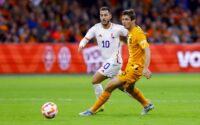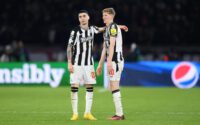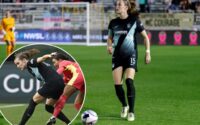Stream It or Skip It?
Euro soccer fans may find Netflix documentary Anelka: Misunderstood fascinating. It’s a biography of French one-time wunderkind Nicolas Anelka, and it pries into his skull just enough to gain some insight into his bottled-up, aloof character. He was a talented footballer who frequently found himself in the eye of media shitstorms, and now shows some desire to show the differences between the headlines and who he really is.
The Gist: “One of the greatest strikers ever,” one talking head proclaims of Anelka. Other sentiments: He’s not politically correct; he’s uncompromising. He hails from the Parisian suburb of Trappes, and we see the small stretch of yard where he played soccer as a boy. He showed enough flash and competitive zeal as a youngster to leave home for a training center at 13; by 16, he was snapped up by the Paris Saint-Germain Football Club, but soon jumped to London, establishing himself as a hot upstart striker for the Arsenal FC, inspiring the team to Premier League and FA Cup championships in his first season.
This auspicious start would be followed by a restless rollercoaster of a career, playing for a smattering of teams and stirring controversy with diva-like behavior, including frequent clashes with management for the French national team began. His first major adversity came at age 18, when a big-money transfer took him to Real Madrid, where he was greeted with a coldly competitive team environment and intense media criticism; after failing to score a single goal in five months, he was being eaten alive by the press and his internal stress. He returned to PSG, then played for Liverpool, Manchester City, Bolton and Chelsea, and his clashes with coaches became a recurring theme.
None was greater than in 2010, when his first World Cup appearance became a moment of apparent self-destruction; an altercation with coach Raymond Domenech got him booted from the team after a newspaper claimed Anelka levied a litany of obscenities at the coach. The players revolted, the team was swiftly eliminated, and Anelka held tight to his insistence that he didn’t say those words, taking the paper to court for libel and losing when the ruling asserted that journalistic exaggeration isn’t illegal. Three years later, while playing for West Bromwich Albion, another disagreement with a coach led to Anelke’s benching, the coach’s firing and, in his first game back on the pitch, he scored a goal and directed at his ex-leader the “quenelle” arm gesture, generally considered to be anti-Semitic. He was suspended, and still maintains it was intended to be “anti-establishment,” and underscores how a league committee determined he wasn’t anti-Semitic.
In-between highlight footage, news clips and generally Anelka-friendly commentary from a variety of peers and analysts, we get vignettes of the now-retired player’s life as a family man. He lives a fairly cushy life in Dubai with his wife and two sons, and he makes sure he tells the boys he loves them every day, he says, because he and his parents struggled to do that. He still shows flashes of his competitive self when he urges his son to buckle down and show some drive — and they’re playing a friendly game on the beach with family. He coaches a little, and maybe reflects a little more on the man he was and the man he is now.
What Movies Will It Remind You Of?: Misunderstood is a slightly sub-30 for 30-style doc, a little less probing than, say, Vick or Lance, which benefited from their subjects’ willingness to be quite raw and open. As for soccer docs, Amazon series This is Football and Netflix series Maradona in Mexico are more compelling for general audiences.
Performance Worth Watching: Seeing young Anelke tearing up the pitch as an 18-year-old in archival footage will be a nice nostalgia trip for many fans.
Memorable Dialogue: Anelka opens the film with a straight-shooting piece of advice: “All that I’ve done, don’t do it.”
Sex and Skin: None.
Our Take: As a stupid fructose-eating American who thinks football is exclusively a thing played with helmets, pads and permanent brain damage, I frequently paused Anelke: Misunderstood to properly contextualize what I was seeing. In other words, if you’re not already hep to the lingo, rules and politics of Euro soccer, you may find yourself stuck in the weeds without a sickle. (“Siri, what the hell is a quenelle?”)
I determined that Anelke’s American football equivalent was someone like Terrell Owens, a generational talent who could be troubled and toxic both on and off the field. It helps to know that Anelke’s standoffish, uncompromising persona defined him during his active sporting years, a probable result of his quasi-child-star experiences — knowing that he was fed to sharks while still a teenager helps explain his reluctance to open himself to the media. So getting glimpses into his personal life may not be a big deal for your basic sports documentary, but it’s sort of a big deal for a guy like Anelka.
The media gets a thorough whipping by the narrative here, but Anelke points a little bit at himself, too. Misunderstood points at him being a complex human being with faults like everyone else, and director Eric Hannezo seems happy to reach that conclusion, since it modestly transcends his subject’s public persona. He’s less interested in whether there’s a deeper angle on the libel-case court ruling (maybe he should interview someone other than Anelke’s lawyer for analysis), or if Anelke’s struggles were a result of too much, too soon as a very, very young player who found himself in a brutal scenario. The doc isn’t quite a hagiography, and there’s a little bit of subtext here, but not enough to render it more than just a solid sports-bio aimed at soccer nuts.
Our Call: STREAM IT, but it’s ultimately for fans only.
John Serba is a freelance writer and film critic based in Grand Rapids, Michigan. Read more of his work at johnserbaatlarge.com or follow him on Twitter: @johnserba.


